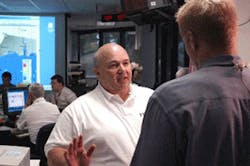The devastation caused by Hurricane Katrina has prompted President George W. Bush to declare major disaster areas in parts of Louisiana, Alabama, Mississippi and South Florida. The City of New Orleans remains evacuated and the Port of New Orleans is shut down.
Reuters reported that damages may cost as much as $25 billion.
“Medical assistance teams and rescue teams have been deployed, and we're continuing to coordinate all activities very closely to make sure that the focus is on saving lives,” White House Press Secretary Scott McClellan said today. “That's where the top priority is right now, and that's where it will remain.”
“Basically it’s very early and efforts are focused on first responders, and search and rescue,” Cathy Gautreaux, executive director of the Louisiana Motor Transport Assn. told Fleet Owner. “I-10 is shut down but still open to emergency vehicles. Even those people displaced can’t return to their homes.”
Efforts to marshal the trucking industry toward relief efforts are at a very early stage, Gautreaux added. “We’re working with state police and trying to help the state coordinate trucks and supplies. Right now they’re developing a database for trucking companies that want to assist. But it’s still very much a search and rescue effort. They’re trying to save people— this is going to be a long haul.”
Jack A. Legler, director of emergency planning and response for the American Trucking Assns.’ Highway Watch program said that the magnitude of the damage will present long-term challenges to the local economy, as well as rebuilding efforts. “At this scale its not just the response but it’s the continuity of the [effects of the hurricane],” Legler told Fleet Owner. “We may be treading new territory on this one.
“Nothing is running in [New Orleans] whereas in Hurricane Andrew the damage was mostly residential,” Legler continued. “Essentially, a major city and a major port has been shut down for an indefinite period of time. And the supply chains tend to respond— they tend to work where they normally work in most disasters. The biggest impact for us is fuel. As far as [the trucking industry’s] ability to respond— when [officials] see the truck, they wave it through. We don’t have a problem getting there as long as there’s someone to receive the supply and there’s fuel to keep the truck running.”
In terms of fuel, the infrastructure appears to have suffered significant disruptions in the Gulf region. Fleet Owner received an anecdotal report of people driving 90 miles to wait in line at a gas station. “Right now, we’re talking about a significant chunk of refining capacity that’s offline,” said Legler. “Short term the question is where we can get fuel at all before price even becomes an issue.”
However, there are reports that large trucking companies with terminals in the area were spared crippling damage to assets during the storm. For example, The El Paso Times reported that Knight Transportation evacuated its Gulfport, MS terminal before Katrina hit.
Brian Suber, spokesperson for Houma, LA-based Saia, which is owned by SCS Transportation, told Fleet Owner, “We’re bouncing back a lot sooner than expected.”
“Large carriers typically move trucking assets out the way when hurricanes are coming,” said Highway Watch’s Legler. “The trucking industry is extremely resilient.
